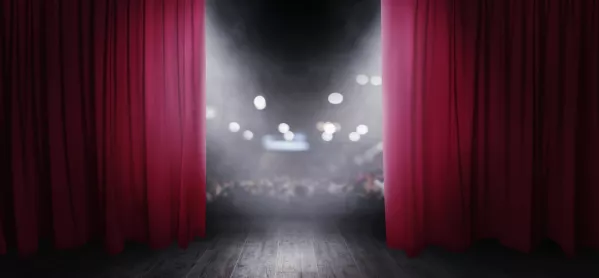Should you be putting on a show in school?

I love the moment in a classical concert when the conductor taps his baton on his stand, bringing everyone to attention. Or the clack of the drummer’s sticks as he taps out time for the band about to play. Or the “1-2-3-4” of the singer’s cry. Or the moment the house lights come down, just before the curtains rise. All of those are moments of exquisite anticipation. You know that between now and the end of whatever is starting, an experience will have been had, things will have changed. Of course, they could go awfully wrong as well as being great. But that’s the excitement; for a second you stand on a precipice, a tightrope, and in that second, all the vulnerability of the experience is encapsulated.
I remember when I first started teaching, I felt like that at the outset of every lesson. I felt like I was walking out on stage, and all eyes were on me. Whatever happened next was wholly in my hands, for good or ill. Anything could happen. I could end that lesson high on cloud nine or lost in the depths of dark despair. Over the years, I’ve lost that excitement, that thrill, largely because the unpredictability has gone. I’ve done it so many times now, I know what to expect, I know what will happen. And I know how to deal with most situations that might arise. I’m no longer vulnerable in the same way I was. And I think that means I’ve lost something important.
From the classroom: Is your wardrobe ready for the new term to start?
Opinion: Get the students to teach - you’ll learn a thing or two
More from David Murray: Why I am in awe of those teachers in global crisis
Recent studies have shown that experts are not always the best teachers. They can sometimes complicate what they are teaching. They can have so wide a knowledge that they can find it hard to whittle it down into manageable chunks. A teacher who is good enough is often more than good enough. But I have been that teacher and it can be uncomfortable to feel like you’re flying by the seat of your pants. You feel vulnerable when you know your limits in a topic and then a student asks a sensible question. You’re faced with a choice: do I bluff through this or do I admit that I don’t know and promise to find out. At times, to my shame, I have opted for the bluff. It’s awkward and awful and I doubt anyone in that room has been convinced. Now I am far readier to take the latter path and promise to return to the issue when I’ve read a bit wider. It’s been my very vulnerability that has made me more trustworthy.
Teachers build students’ trust by showing their vulnerability
I never liked maths at school. I struggled with it. Nonetheless, I did it for A level. I wrestled with it but I trusted my teacher, Mrs Grindrod. I trusted her because sometimes she found it difficult, too. If she found it hard, she wouldn’t bluff her way through but would go away and work it out and then come back with an answer, knowing the mistakes we might make. There were other maths teachers who were absolute geniuses in the field. I never wanted to be in their class, because they just made me feel really stupid. My teacher’s vulnerability made me trust her. It made her more human.
And I think that’s what vulnerability does; it renders us, for a moment, more human. Naturally, humans are pretty defenceless creatures, without claws or fangs, without tough hide or venom. So we encase ourselves in other things to protect us. We build up our shields and hide behind walls of power or authority, making ourselves invincible because we’re unquestionable. And I have seen that with teachers. “Because I said so,” is never really a good answer. Not if you’re really trying to educate. Being honest is a gift to other people. Being vulnerable is a gift. It’s trusting someone with your humanity.
I don’t think teachers should scorn or avoid their own vulnerability. Let yourself be human. That’s how a relationship is built and, whatever it is, education is based upon relationships. Students are naturally curious about their teachers. They probe for information. They are not being rude or disrespectful. They’re trying to see if you’re human. They’re looking for connection. Some of the best teachers I have known were terrible students at school. They messed around, they failed exams. That means they know what it’s like, they have been in the place of that struggling student. They can relate. And their own vulnerability allows them to change lives.
Vulnerability, of course, can be uncomfortable and I’m not advocating any kind of inappropriate sharing or emotional incontinence. Just humanity. I’ve walked into classes in the middle of a bad day and said to the class, “Look, I’m in a really bad mood today. I need to let you know that.” And they’ve buckled down, worked and been brilliant. Because my vulnerability meant they could trust me. They know the next lesson will be different. They’re learning there about relating and changing, about the shifts in relationships, about the need to be flexible, about humanity.
David Murray is an English teacher at City of Stoke-on-Trent Sixth Form College
You need a Tes subscription to read this article
Subscribe now to read this article and get other subscriber-only content:
- Unlimited access to all Tes magazine content
- Exclusive subscriber-only stories
- Award-winning email newsletters
Already a subscriber? Log in
You need a subscription to read this article
Subscribe now to read this article and get other subscriber-only content, including:
- Unlimited access to all Tes magazine content
- Exclusive subscriber-only stories
- Award-winning email newsletters